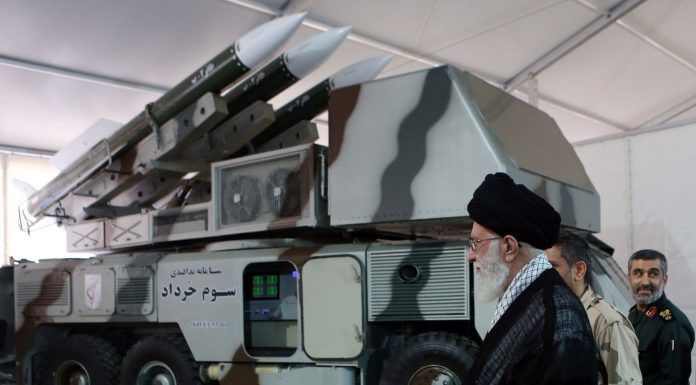By Hamdi Malik, Al-Hayat Newspaper
The U.S. withdrawal from the 2015 Joint Comprehensive Plan of Action (JCPOA), commonly known as the Iran nuclear deal, and reimposition of crippling economic sanctions have presented the Islamic Republic with only limited options.
Although the sanctions have brought the country’s economy to the brink of total collapse, Iranian leaders do not see any advantage in returning to the negotiating table. Tehran believes that agreeing to a new round of talks means surrendering to the U.S. and losing all that it had gained as the result of the 2015 nuclear deal.
In May 2018, U.S. Secretary of State Mike Pompeo said Iran had to meet 12 conditions before Washington would consider lifting the sanctions including its support for Hezbollah, Hamas, and Islamic Jihad, and end its proliferation of ballistic missiles.
Iran will not abandon its regional ambition and missile program. The Islamic Republic’s leaders believe that showing flexibility in any of these areas will lead to their eventual downfall. That is perhaps the principal reason for the regime’s unwillingness to renegotiate the nuclear deal.
Some political observers believe that by avoiding both war and peace, Iran hopes to buy a little time until the 2020 U.S. elections, which could put Democrats back in the White House who Tehran hopes will rejoin the JCPOA.
However, “neither war nor peace” could prove to be a costly strategy for Iran. Some economists believe that by 2020 the regime will be in a much weaker position given that Iranian oil exports will drop to near zero, and the country’s foreign currency reserves will be severely depleted by then.
Iranian oil exports have dropped below 300,000 barrels per day (bpd). By contrast, Iran shipped 2.5 million bpd in April 2018, a month before President Donald Trump withdrew the U.S. from the JCPOA. Iranian Oil Minister Bijan Namdar Zanganeh recently said that the conditions were “worse than those during the Iran-Iraq War.”
A massive drop in oil export, which is Iran’s primary source of revenue, will prevent the regime from funding Shia militia groups in the region. Although some of Tehran’s regional allies share the same ideological and religious beliefs with the regime, they mostly keep close ties with Iran for financial reasons. Therefore, it will not come as a big surprise if some of these groups were to distance themselves from the regime once the funding stops. The Islamic Republic’s military power and political influence in the region will gradually diminish. Iran’s future depends on its oil revenue, non-oil economy, and sanctions.
Iranian leaders would like to avoid having a fate similar to Iraq’s at all cost. The U.S. imposed a set of stringent sanctions on Iraq after it invaded Kuwait in 1990, which gradually crippled the country’s economy and led to the eventual downfall of Saddam Hussain and the Baathist regime at the hands of the U.S. military in 2003.
Iranian leaders are opting for a third option, namely escalating regional tensions, because they do not consider that going back to the negotiating table or continuing with “neither war nor peace” tactics are viable strategies. Some senior officials in Iran believe that increasing tension is the only way to end the current crisis. They argue that tension and conflict will force the U.S. to lift the sanctions.
The Islamic Republic can play the nuclear and escalating-tension cards against the U.S. By increasing its enriched uranium stockpile beyond the limits set by the JCPOA, Tehran is trying to pressure European governments to persuade the U.S. to lift the sanctions. However, the strategy has backfired, and pushed the Europeans away from Iran and closer to Washington. Some countries have even threatened to reimpose sanctions on Iran should it scale down its commitment to the JCPOA.
Given the failure of its nuclear strategy, Iran has adopted the third option by attacking oil tankers in the Persian Gulf and shooting down a U.S. military drone near the Strait of Hormoz which Tehran probably considers as part of a broader armed conflict. Some senior Iranian military commanders believe that war with the U.S. is inevitable and, therefore, should happen now while Iranian armed forces are strong, and the U.S. does not have an appetite for a full-blown armed conflict. They argue that a war will force the U.S. to make some concessions to Iran.
Iran will most likely continue its provocative actions in the Persian Gulf to force the U.S. into a war. So an armed conflict between these two countries seems to be a real possibility, given Iran’s continued attack on oil tankers and efforts to disrupt the world’s energy supply.
[Translated from Persian by Fardine Hamidi]
Note: Al-Hayat is a London-based, pan-Arab newspaper owned by Saudi Prince Khalid bin Sultan. Dr. Hamid Malik is a Middle East analyst and contributor to Arabic, Farsi and English-language TV and newspapers.


